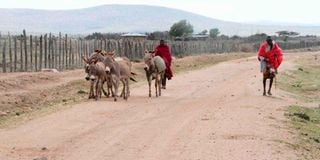Donkeys numbers rise in Narok after Munya order closing abattoirs

Communities along the Kenya-Tanzania border are still reeling from the loss of over 10,000 donkeys two years ago to a smuggling racket.
Many families say the illegal trade in donkey skin and other products has disrupted their livelihoods and harmed the health and welfare of the animals.
In the border town of Olpusimoru, Narok West sub-county, for example, donkeys remain a crucial component of the rural economy, transporting food, water, firewood and farm produce.
Farmer Molonga Lengume’s life changed when he lost 18 donkeys two years ago as demand for donkey skin rose, much of it going to China, where it is used to make traditional medicine.
“Every donkey stolen from a dependent family or community in Kenya or Tanzania two years ago affected our rural economies, because this is the means used to transport food, water, firewood and farm produce from place to place,” he said.
The Nation spoke to Mr Lengume at the Esoit chief’s office in Olpusimoru on Wednesday when he and other farmers briefed officials from the Africa Network for Animal Welfare (ANAW) on the status of donkeys in their area.
Mr Lengume said there is a ray of hope as locals have started restocking the beasts of burden. He said he had bought three.
ANAW partners with Brooke East Africa on a project seeking to disrupt illegal cross-border movement of donkeys in Kajiado and Narok counties.
Slaughterhouses shuttered
The agency said at least 500,000 households keep and depend on donkeys countrywide, 50,087 of them in Narok County, whose total donkey population had declined to 81,932.
Another farmer, Olkimunyak Kereto, hailed the closure of donkey abattoirs in Naivasha, Mogotio and Turkana by Agriculture and Livestock CS Peter Munya, saying the ban will protect donkeys.

The Kenya-Tanzania border at Olpusimoru area in Narok West.
The three Chinese-operated slaughterhouses shuttered two years ago were Zilzha in Nakwaalele, Turkana; Goldox in Mogotio, Baringo; and Star Brilliant Abattoir in Naivasha, Nakuru.
“The closure of these slaughterhouses has given us hope of restocking our herds of donkeys. I lost 16 donkeys to the cross-border conduit between 2017 and 2019 but I have now bought four and I am buying more through the exchange or barter trade with cows,” Mr Kereto said.
As the drought continues in Kenya because of climate change, donkeys support herders in the migration of livestock to greener pastures, where they are used to ferry food, clothing and shelter materials.
Esoit Chief Geoffrey Ntayia echoed the farmers’ sentiments.
“I used to handle at least four to five cases of donkey theft every day before these slaughterhouses were closed, but the trend has changed since 2019 and we are seeing a rise in donkey numbers in the past two years,” he said.
"When donkeys are stolen or killed, women are turned into donkeys to accompany the migrating livestock to where they would get enough grass, which is not good.”
Kenya has been identified as a conduit for smuggling donkeys from neighbouring countries, says a new report from ANAW.
Programme Manager Denis Bahati said trucks arrive every day in Olpusimoru to collect stolen donkeys headed for slaughterhouses.
“Before the closure of slaughterhouses there were reports that donkeys were also being stolen from neighbouring Tanzania because of diminishing numbers in Kenya and were loaded into lorries in Olpusimoru at night,” Dr Bahati said.
Speaking in Olpusimoru on Wednesday, Dr Bahati recommended that donkey slaughter be prohibited in Kenya.
“We urge the amendment of the Meat Control Act to remove the donkey as a food animal. We also urge the government to enhance border security to prevent theft and smuggling of donkeys in Tanzania and Ethiopia where we have operational donkey abattoirs,” he said.
A 2009 census put the number of donkeys in Kenya at 1.8 million. But animal rights activists have raised the alarm, saying 100,000 donkeys are slaughtered each year.
Unscrupulous traders kill the animals illegally and sell them as beef meat in local butcheries.





